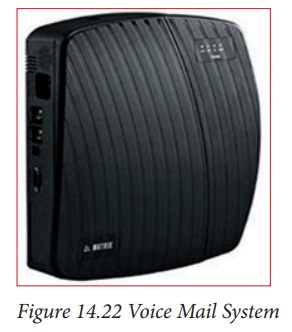Chapter: 11th Computer Technology : Chapter 14 : Computer Network
Internet Applications
Internet
Applications
SMS
SMS
stands for Short Message Service. It is commonly referred to as "text
messaging,". It is a service for sending short messages of up to 160
characters (224 characters if using a 5-bit mode) to mobile devices, including
cellular phones, smartphones and PDAs.
Voice Mail System (VMS) and answering Machine
Voice
mail system can be thought as a message box for phone user to store voice
messages and retrieve it through telephone. User can divert all his calls to
his voice mail system when he wishes so.

Main
difference between answer machine and voice mail system is that voice mail
system is a centralized system where voice mail boxes are managed for many
users, while answering machine is an independent individual system connected to
a telephone line. Many telephone instrument comes with built-in answering
machine.
![]()
![]()
![]() Messages stored in answering machine is played back on the
answering machine equipment, cannot be accessed remotely. But voice mail
messages can be accessed, listened and managed from anywhere in the world
through telephone line.
Messages stored in answering machine is played back on the
answering machine equipment, cannot be accessed remotely. But voice mail
messages can be accessed, listened and managed from anywhere in the world
through telephone line.
Answering
machine is usually suitable for home use for single line, while voice mail
system is more suitable for office use where there are multiple telephone
connections as well as extensions through EPABX.
E-mail
(electronic mail) is the exchange of computer-stored messages by
telecommunication. E-mail messages are usually encoded in ASCII text. However,
you can also send non-text files, such as graphic images and sound files, as
attachments sent in binary streams. E-mail was one of the first uses of the
Internet and is still the most popular use. A large percentage of the total
traffic over the Internet is e-mail. E-mail can also be exchanged between
online service provider users and in networks other than the Internet, both
public and private.
Chat
Chat
is a text-based communication that is live or in real-time. For example, when
talking to someone in chat any typed text is received by other participants
immediately.
Video Conferencing
A
video conference is a live, visual connection between two or more people
residing in separate locations for the purpose of communication. At its
simplest, video conferencing provides transmission of static images and text
between two locations. It provides transmission of full-motion video images and
high-quality audio between multiple locations.
For
example, a point-to-point (two-person) video conferencing system works much
like a video telephone. Each participant has a video camera, microphone and
speakers mounted on his or her computer. As the two participants speak to one
another, their voices are carried over the network and delivered to the other's
speakers and whatever images appear in front of the video camera appear in a
window on the other participant's monitor.
![]()
![]()
![]() Multipoint videoconferencing allows three or more
participants to sit in a virtual conference room and communicate as if they
were sitting right next to each other.
Multipoint videoconferencing allows three or more
participants to sit in a virtual conference room and communicate as if they
were sitting right next to each other.
Related Topics